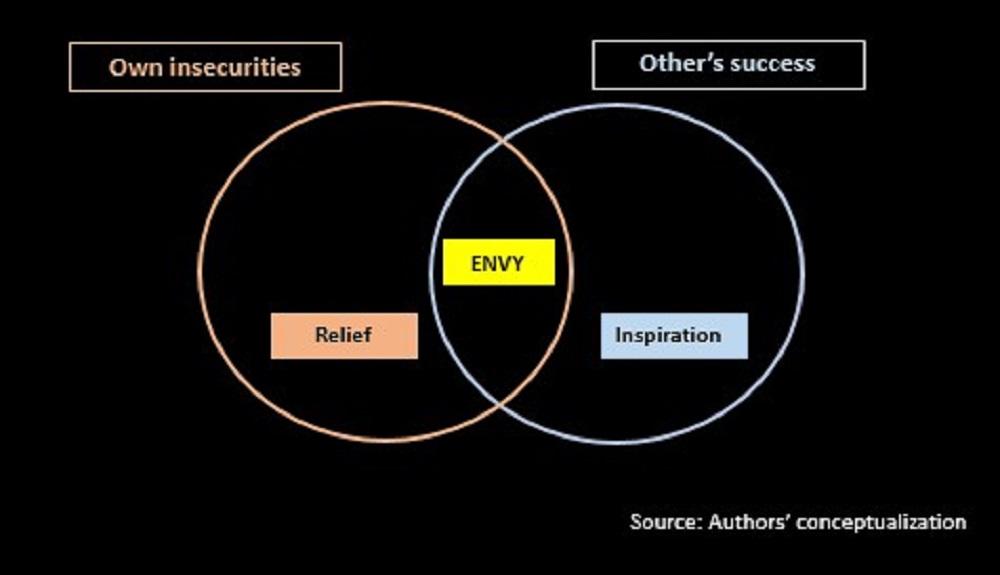Even the most casual of sports fans have watched Roger Federer and Rafael Nadal play against each other over the years. The two, together, have given us some of the best tennis and if you’ve followed their journey more closely, Wimbledon 2008 readily come to mind. Federer was the undisputed champion at the time, with his successive wins, especially on the grass court, and had been further immortalized by David Foster Wallace’s profile that likened watching him to a religious experience. By this time, Nadal was quickly emerging as a worthy challenger. In that Wimbledon final, after 4 hours 48 minutes, several rain interruptions, long rallies, and tie-breakers, Nadal finally won. Federer was said to be heartbroken. In the documentary Strokes of Genius, made years after the match, Federer commented, “I had to embrace the idea of a rival. In the beginning, I didn’t want to have one.”
We’ve all been in similar situations, perhaps not with such high stakes, but comparable all the same. There’s always that pang when someone does better than us: colleagues who get early promotions, friends who are more social, neighbors with more money, or even family members who seem to be more loved and respected. It’s called envy, and Aristotle described it as the pain at the good fortune of others.
At the heart of envy lies the very human tendency to compare ourselves with others. People typically engage in social comparisons with those whom they perceive to be similar to them and it serves as an easy way to measure where we stand on the social hierarchy of life.
How does our ‘animal’ brain react when we encounter others who might be similar to us but with successes that are grander than our own? Typically, we feel threatened and instinctively try to close the gap. An easy and reactionary way to do this is by pulling those successful others back by belittling them with an attempt to diminish their achievements. We say things like, “Well, she was just lucky,” or “He just got the plum assignment because he plays politics.” We socially undermine them and attribute external reasons for their success instead of acknowledging that they worked hard or are perhaps simply more talented than us. We fragile beings are capable of quite a lot in our efforts to avoid a bruising to our self-esteem.
Being envious is, in fact, damaging to one’s sense of self, not to mention one’s relationships with others. In the extreme, giving way to envy destroys mental and physical health. It can also lead to a downward spiral of behaviors where we try to sabotage others and in the process hurt our own performance. When there is envy within teams, it leads to less cohesion and knowledge-sharing, making the group dysfunctional and more likely to miss opportunities for growth and development.
Yet, envy doesn’t have to be destructive. In fact, that unwelcomed pang can actually signal an opportunity, an invitation to feel a sense of admiration and awe for another person and, in turn, to be inspired. For example, in regards to career progression, envy can be used to close the gap between ourselves and the more successful person – but by impelling us forward rather than pulling the other back. Researchers call this benign envy and it entails a significant shift in mindset and it can motivate us to strive to become and do better. That’s what Federer did after reflecting on his losses to Nadal: “Eventually I realized that something good can be taken out of these situations…I might have to adjust my game a little bit…and why not.”
We will always and inevitably come across people who are better than us. Yet, it is possible to train our mind to address our envy in a positive way and harness its motivational momentum. My colleague Siyao (Amber) Zhu, a PhD candidate at IE Business School, and I have developed three steps to help turn envy into inspiration:
1. Bolster your self-respect. Those who are confident in themselves and have healthy self-esteem are less likely to succumb to hostile envy and can avoid reacting negatively when they do encounter it. Thus, it’s important to genuinely feel good about yourself in the many aspects of your life, from the personal to the professional. To do this, try writing down your strengths and reflect on them from time to time. If you need self-affirmation, then actively seek it. For example, keeping an email folder of acknowledgments from others and rereading them from time to time can provide a needed boost of self-esteem. Being secure in one’s self does not equate with an inflated self-view of “I know it all” but translates into “I don’t know this but I can learn.”
2. Appreciate others in a genuine way. In order to convert the success of others into a personal learning opportunity, take the time to think about how they reached that particular achievement and consider the specifics of what you appreciate about that success. For example, if you are feeling envious of a colleague’s promotion, is it because of their new job title, the type of projects it entails, or is it because of the respect they get from peers? Perhaps it is not the promotion you envy at all, but a product of that accomplishment which you can attain through a similar but more personalized success.Furthermore, suppressing one’s envy is emotionally exhausting. Instead, speak to that other person, congratulate them, and share your appreciation of their efforts. By taking the time to have a conversation, you can regulate those feelings of envy and also learn some best practices that might help you achieve your own goal. Remember to first genuinely acknowledge the other person in your own mind or else that hidden envy is likely to leak into your body language and facial expressions.
3. Create a personalized path to success. After having analyzed the other person’s success and understanding the steps they took to get there, it’s time to re-analyze your own goals. What are you striving for and does it match your personal values? Is getting that promotion or being assigned a particular high-profile project relevant to your life’s purpose? Such self-reflection takes an incalculable amount of time, but it will help to determine the steps necessary to travel your personal path toward your own version of success. Ask yourself, what actions can I consciously take and how can I develop myself towards this goal? Of course, this does not need to be a solo effort and a good option is to enlist your managers – and even your successful colleague – in your efforts to capitalize on the self-improvement potential of your envy.
Ultimately, it is not about having one-up over another person; it’s about becoming a better version of yourself. Once we learn to recognize our feelings of envy, we can begin to understand the role they play in our daily life – and to harness them to our advantage. As Federer said, “As much as you want to win, you also want to become the best player you can be in your lifetime.”
© IE Insights.







